Items filtered by date: May 2023
Plant-Based Foods and Gout
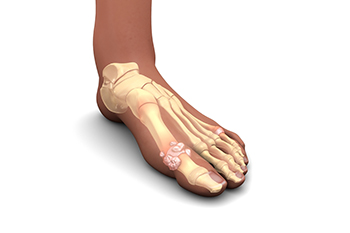
Gout is a particular kind of foot affliction that is essentially a form of inflammatory arthritis. In particular, gout is often characterized by pain in the joints of the feet. There are specific types of foods that are either good or bad for increasing the risk of gout. Importantly, plant-based foods can decrease the risk of triggering a gout attack. The reason for this is that plant-based foods are especially low in purines. There are many different types of plant-based foods. The list includes beans, seeds, nuts, vegetables, and whole grains. If you are someone that has gout attacks, it is suggested that you schedule an appointment with a podiatrist who can help you to find relief and manage this painful condition.
Gout is a foot condition that requires certain treatment and care. If you are seeking treatment, contact Dr. Thomas E. Silver from Westwood Foot Clinic. Our doctor will treat your foot and ankle needs.
What Is Gout?
Gout is a type of arthritis caused by a buildup of uric acid in the bloodstream. It often develops in the foot, especially the big toe area, although it can manifest in other parts of the body as well. Gout can make walking and standing very painful and is especially common in diabetics and the obese.
People typically get gout because of a poor diet. Genetic predisposition is also a factor. The children of parents who have had gout frequently have a chance of developing it themselves.
Gout can easily be identified by redness and inflammation of the big toe and the surrounding areas of the foot. Other symptoms include extreme fatigue, joint pain, and running high fevers. Sometimes corticosteroid drugs can be prescribed to treat gout, but the best way to combat this disease is to get more exercise and eat a better diet.
If you have any questions please feel free to contact our office located in Golden Valley, MN . We offer the newest diagnostic and treatment technologies for all your foot and ankle needs.
Why Do Feet Fall Asleep During Pregnancy?
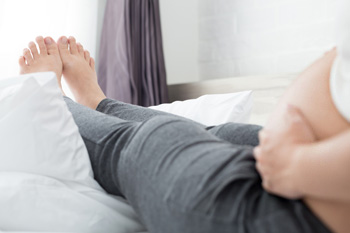
During a woman’s pregnancy, she might notice that her feet fall asleep frequently. In other words, she might notice that her feet often experience numbness or a pins-and-needles feeling. This is actually not an uncommon symptom that results from pregnancy. In fact, many women can experience this feeling in the feet at night or immediately upon waking in the morning. The reason why pregnancy can cause numbness in the feet is due to the fact that pregnancy can lead to nerve compression in this area. If you are someone that is pregnant or planning to be, it is suggested that you contact a podiatrist today. This foot specialist will be able to help the pregnant woman navigate feelings of numbness in the feet.
Pregnant women with swollen feet can be treated with a variety of different methods that are readily available. For more information about other cures for swollen feet during pregnancy, consult with Dr. Thomas E. Silver from Westwood Foot Clinic. Our doctor will attend to all of your foot and ankle needs.
What Foot Problems Can Arise During Pregnancy?
One problem that can occur is overpronation, which occurs when the arch of the foot flattens and tends to roll inward. This can cause pain and discomfort in your heels while you’re walking or even just standing up, trying to support your baby.
Another problem is edema, or swelling in the extremities. This often affects the feet during pregnancy but tends to occur in the later stages.
How Can I Keep My Feet Healthy During Pregnancy?
- Wearing orthotics can provide extra support for the feet and help distribute weight evenly
- Minimize the amount of time spent walking barefoot
- Wear shoes with good arch support
- Wear shoes that allow for good circulation to the feet
- Elevate feet if you experience swelling
- Massage your feet
- Get regular, light exercise, such as walking, to promote blood circulation to the feet
If you have any questions please feel free to contact our office located in Golden Valley, MN . We offer the newest diagnostic and treatment technologies for all your foot and ankle needs.
Health Problems Caused by Flat Feet
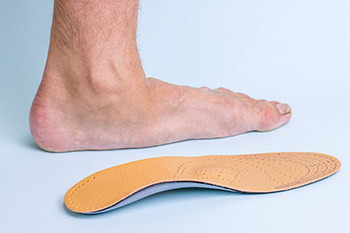
Having flat feet, or pes planus, is a common condition among adults. Flat feet, sometimes called fallen arches, can cause problems with the ankles and knees. In addition, they can have a negative effect on body alignment, which can increase the likelihood of injury while engaging in sports or other activities. Many people do not experience pain from having flat feet, while others may feel pain in the arch or ankle. The pain may be worse at night or after engaging in prolonged activity. The main problem with flat feet is that the arch cannot support the soft tissues in the foot, causing swelling and fatigue. Obesity is one of the main contributors to developing flat feet. Diabetes, rheumatoid arthritis, and aging are other common factors. A number of treatments for flat feet are available for people who have problems caused by flat feet. Among them are custom orthotics, which can be made by a podiatrist to address the specific problems of your feet. If you have pain or discomfort from flat feet, it is suggested that you make an appointment with a podiatrist.
Flatfoot is a condition many people suffer from. If you have flat feet, contact Dr. Thomas E. Silver from Westwood Foot Clinic. Our doctor will treat your foot and ankle needs.
What Are Flat Feet?
Flatfoot is a condition in which the arch of the foot is depressed and the sole of the foot is almost completely in contact with the ground. About 20-30% of the population generally has flat feet because their arches never formed during growth.
Conditions & Problems:
Having flat feet makes it difficult to run or walk because of the stress placed on the ankles.
Alignment – The general alignment of your legs can be disrupted, because the ankles move inward which can cause major discomfort.
Knees – If you have complications with your knees, flat feet can be a contributor to arthritis in that area.
Symptoms
- Pain around the heel or arch area
- Trouble standing on the tip toe
- Swelling around the inside of the ankle
- Flat look to one or both feet
- Having your shoes feel uneven when worn
Treatment
If you are experiencing pain and stress on the foot you may weaken the posterior tibial tendon, which runs around the inside of the ankle.
If you have any questions please feel free to contact our office located in Golden Valley, MN . We offer the newest diagnostic and treatment technologies for all your foot and ankle needs.
Is My Heel Pain Plantar Fasciitis?
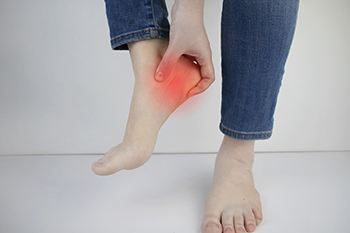
One of the most common foot problems is plantar fasciitis. It is an inflammation of the plantar fascia, which is the band of tissue that is found on the sole of the foot. It connects the heel to the toes, and it can become inflamed for various reasons. These include standing on hard or uneven surfaces for long periods of time or wearing shoes that have inadequate heel support. It can also happen from the aging process that may gradually wear down the heel pad. Some people endure an injury that can tear the plantar fascia, including a sudden fall, repetitive cycling, or frequent participation in running or jumping activities. Plantar fasciitis can be a common condition among people who are overweight, which may cause the fat pads to prematurely flatten as a result of the added weight the feet must carry. If you have pain in your heel or arch area, it is strongly suggested that you consult a podiatrist who can accurately diagnose the condition and offer the correct treatment options.
Plantar fasciitis is a common foot condition that is often caused by a strain injury. If you are experiencing heel pain or symptoms of plantar fasciitis, contact Dr. Thomas E. Silver from Westwood Foot Clinic. Our doctor can provide the care you need to keep you pain-free and on your feet.
What Is Plantar Fasciitis?
Plantar fasciitis is one of the most common causes of heel pain. The plantar fascia is a ligament that connects your heel to the front of your foot. When this ligament becomes inflamed, plantar fasciitis is the result. If you have plantar fasciitis you will have a stabbing pain that usually occurs with your first steps in the morning. As the day progresses and you walk around more, this pain will start to disappear, but it will return after long periods of standing or sitting.
What Causes Plantar Fasciitis?
- Excessive running
- Having high arches in your feet
- Other foot issues such as flat feet
- Pregnancy (due to the sudden weight gain)
- Being on your feet very often
There are some risk factors that may make you more likely to develop plantar fasciitis compared to others. The condition most commonly affects adults between the ages of 40 and 60. It also tends to affect people who are obese because the extra pounds result in extra stress being placed on the plantar fascia.
Prevention
- Take good care of your feet – Wear shoes that have good arch support and heel cushioning.
- Maintain a healthy weight
- If you are a runner, alternate running with other sports that won’t cause heel pain
There are a variety of treatment options available for plantar fasciitis along with the pain that accompanies it. Additionally, physical therapy is a very important component in the treatment process. It is important that you meet with your podiatrist to determine which treatment option is best for you.
If you have any questions, please feel free to contact our office located in Golden Valley, MN . We offer the newest diagnostic and treatment technologies for all your foot care needs.
Heel Pain Can Be Treated!
Caring for Children’s Feet
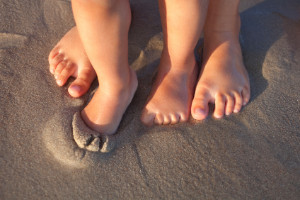
Children are born with 22 bones in their feet. By the time they are five years of age, that number increases to 26 bones. It is critical to care for children’s growing feet as they are vulnerable to injury, particularly as they are made of soft, flexible cartilage that will eventually turn to bone. Taking care of children’s feet will help prevent problems as they age. It is beneficial to ensure socks, shoes, and onesies allow the toes room to move and straighten out. It is helpful to check their feet regularly for any potential problems, in addition to cutting the toenails straight across. Encouraging the baby to spend time each day barefoot so they can properly exercise their feet will help them when walking begins. Soft shoes should only be put on a baby’s feet when they can walk. However, the longer a toddler walks without shoes, the faster the feet will develop naturally. It is important to check the size of all foot coverings frequently as children’s feet grow fast. If you would like more information about how to care for your child’s feet, it is suggested that you seek the counsel of a podiatrist who is an expert in this area.
Making sure that your children maintain good foot health is very important as they grow. If you have any questions, contact Dr. Thomas E. Silver of Westwood Foot Clinic. Our doctor can provide the care you need to keep you pain-free and on your feet.
Keeping Children's Feet Healthy
Having healthy feet during childhood can help prevent medical problems later in life, namely in the back and legs. As children grow, their feet require different types of care. Here are some things to consider...
Although babies do not walk yet, it is still very important to take care of their feet.
Avoid putting tight shoes or socks on his or her feet.
Allow the baby to stretch and kick his or her feet to feel comfortable.
As a toddler, kids are now on the move and begin to develop differently. At this age, toddlers are getting a feel for walking, so don’t be alarmed if your toddler is unsteady or ‘walks funny’.
As your child gets older, it is important to teach them how to take care of their feet.
Show them proper hygiene to prevent infections such as fungus.
Be watchful for any pain or injury.
Have all injuries checked by a doctor as soon as possible.
Comfortable, protective shoes should always be worn, especially at play.
If you have any questions please feel free to contact our office located in Golden Valley, MN . We offer the newest diagnostic and treatment technologies for all your foot and ankle needs.

